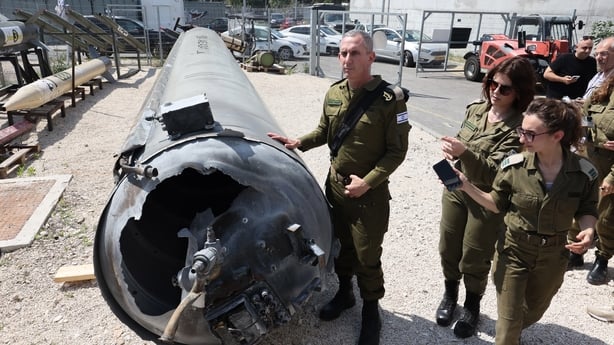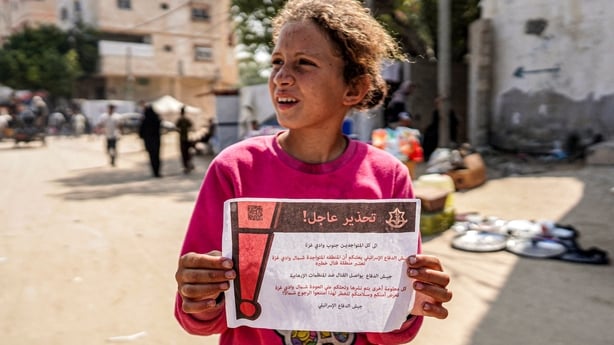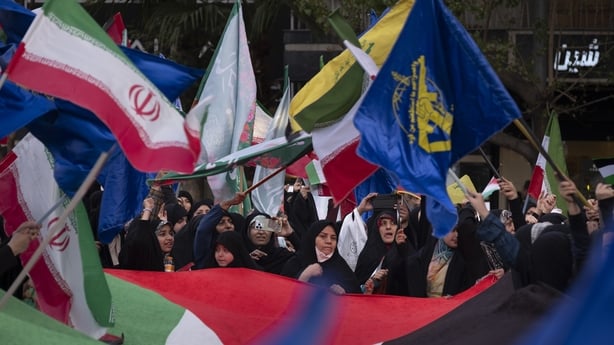A third meeting of Israel's war cabinet set for today to decide on a response to Iran's first-ever direct attack was put off until tomorrow, as Western allies eyed swift new sanctions against Tehran to help dissuade Israel from a major escalation.
Military chief of staff Herzi Halevi had promised that Saturday night's launch of more than 300 missiles, cruise missiles and drones from Iran into Israeli territory "will be met with a response", but gave no details.
While the attack caused no deaths and little damage, thanks to the air defences and countermeasures of Israel and its allies, it has increased concerns that violence rooted in the Gaza war is spreading, and fears of open war between the long-time foes.

Iran launched the attack in retaliation for an airstrike on its embassy compound in Damascus on 1 April attributed to Israel, but signalled that it did not seek further escalation.
President Joe Biden told Israeli Prime Minister Benjamin Netanyahu at the weekend that the United States, would not participate in an Israeli counter-strike.
Together with European allies, Washington instead strove today to toughen economic and political sanctions in an attempt to persuade Israel to abstain from violent retaliation.
EU foreign ministers discuss Iran sanctions
European Union foreign policy chief Josep Borrell, speaking in Brussels after an emergency video conference of EU foreign ministers, said some member states had asked for sanctions against Iran to be expanded and that the bloc's diplomatic service would begin working on the proposal.
Mr Borrell said the proposal would expand a sanctions regime that seeks to curb the supply of Iranian drones to Russia so that it would also include the provision of missiles and could also cover deliveries to Iranian proxies in the Middle East.
Last autumn, Germany campaigned with France and other EU partners to extend an existing European Union sanctions regime against Iran that targets drone production.
Its foreign minister, Annalena Baerbock, said this morning that several EU members had now promised to
look again at extending those sanctions, announcing that she would head to Israel within hours to discuss how to prevent an escalation.
Israeli Foreign Minister Israel Katz said he was "leading a diplomatic attack", writing to 32 countries to ask them to place sanctions on Iran's missile programme and follow Washington in proscribing its dominant military force, the Revolutionary Guard Corps, as a terrorist group.
Treasury Secretary Janet Yellen said the US would use sanctions, and work with allies, to keep disrupting Iran's "malign and destabilising activity".
She told a news conference in Washington that all options to disrupt Iran's "terrorist financing" were on the table, and that she expected further sanctions against Iran to be announced in coming days.
Here, Taoiseach Simon Harris warned of "catastrophic consequences for millions of civilians" if there is an escalation in violence in the Middle East.
He told the Dáil that Iran's "reckless attacks were a significant escalation" and "a flagrant threat to international peace and security".
"The stability of the region is at grave risk," he added.
Russian President Vladimir Putin meanwhile urged all sides in the Middle East to refrain from action that would trigger a new confrontation which he warned would be frauht with catastrophic consequences for the region, the Kremlin said.
Mr Putin, who has forged much closer ties with the Islamic Republic since sending troops into Ukraine in 2022, spoke to Iranian President Ebrahim Raisi by phone about what the Kremlin called "retaliatory measures taken by Iran".
Mr Putin, in his first publicly aired comments on Iran's attack, said the root cause of the current instability in the Middle East was the unresolved conflict between Palestinians and Israel.
"Vladimir Putin expressed hope that all sides would show reasonable restraint and prevent a new round of confrontation fraught with catastrophic consequences for the entire region," the Kremlin said.
"Ebrahim Raisi noted that Iran's actions were forced and limited in nature," the Kremlin said. "At the same time, he stressed Tehran's disinterest in further escalation of tensions."
British Prime Minister Rishi Sunak told Mr Netanyahu in a call today that escalation in the Middle East was in nobody's interest and would only worsen insecurity in the region, so it was "a moment for calm heads to prevail", Mr Sunak's office said.
Mr Sunak had said yesterday that the Group of Seven (G7) major democracies was working on a package of measures against Iran.
Italy, which has the G7 presidency, suggested any new sanctions would target individuals.
Iranian Deputy Foreign Minister Ali Bagheri Kani had told state TV last night that Tehran's response to any Israeli counterattack would come in "a matter of seconds, as Iran will not wait for another 12 days to respond".

The prospect of Israeli retaliation has also alarmed many Iranians already enduring economic pain and tighter social and political controls since protests in 2022-23.
Since the war in Gaza began in October, clashes have erupted between Israel and Iran-aligned groups based in Lebanon, Syria, Yemen and Iraq.
Israel said four of its soldiers were wounded hundreds of metres inside Lebanese territory overnight, the first known Israeli ground penetration into Lebanon since the Gaza war erupted, although it has traded fire with the Lebanese Hezbollah militia.
White House national security spokesman John Kirby declined to say if Mr Biden had urged Mr Netanyahu in talks on Saturday night to exercise restraint in responding to Iran.
"We don't want to see a war with Iran. We don't want to see a regional conflict," Mr Kirby told a briefing, adding that it was for Israel to decide "whether and how they'll respond".
Some analysts said the Biden administration was unlikely to seek to sharpen sanctions on Iran's oil exports due to worries about boosting oil prices and angering top buyer China.

In a call between the Chinese and Iranian foreign ministers, China said it believed Iran could "handle the situation well and spare the region further turmoil" while safeguarding its sovereignty and dignity, according to Chinese state media.
Iran's weekend attack caused modest damage in Israel and wounded a seven-year-old girl.
Most missiles and drones were shot down by Israel's Iron Dome defence system and with help from the US, Britain, France and Jordan.
In Gaza itself, where more than 33,000 people have been killed in the Israeli offensive according to Gaza health ministry figures, Iran's action drew applause.
The UN human rights office said today that Israel is still imposing "unlawful" restrictions on humanitarian relief for Gaza, despite assertions from Israel and others that barriers have eased.
Israel began its campaign against Hamas, the Iranian-backed Palestinian militant group that runs Gaza, after Hamas attacked Israel on 7 October, killing 1,200 people and taking 253 hostages, by Israeli tallies.
Iran's attack prompted at least a dozen airlines to cancel or reroute flights, with Europe's aviation regulator still advising caution in using Israeli and Iranian airspace.
Taoiseach intends to recognise Palestinian state
Meanwhile, the Taoiseach has said that it is "absolutely my intention" to recognise the state of Palestine.
While Mr Harris refused to give a timeline, he said that recognition should be done in a way that will positively impact events on the ground.
"My own assessment is that that time is coming much, much closer," he said.
A number of countries recognising Palestine at the same time "would give weight to that decision," he added.
He will continue to engage with "like-minded countries" on this while at the European Council in Brussels this week, he said.
Fighting continues in Gaza
Israeli tanks have pushed back into parts of the northern Gaza which they had left weeks ago, while warplanes conducted air strikes on Rafah, the Palestinians' last refuge in the south of the territory, killing and wounding several people, medics and residents said.
"Occupation soldiers ordered all families inside the schools and the nearby houses where the tanks had advanced to evacuate. The soldiers detained many men," one resident of northern Gaza told Reuters via a chat app.
Many families who had returned to Beit Hanoun and Jabalia in recent weeks after Israeli forces withdrew, began moving out again because of the new raid, some residents said.
Palestinian health officials said an Israeli strike had killed four people and wounded several others in Rafah, where over half of Gaza's 2.3 million people are sheltering in conjunction they reported that an Israeli air strike had killed 11 Palestinians, including children, in the Al-Maghazi refugee camp in central Gaza.
The Israeli military did not immediately respond to a Reuters request for comment.
The Hamas-run interior ministry said an Israeli airstrike had hit a police car in the Tuffah district of Gaza City, killing four police officers and three civilian passers-by.
The Israeli military also said its forces continued to operate in central Gaza and that they had killed several gunmen who attempted to attack them.
"Furthermore, over the past day, IDF fighter jets and aircraft destroyed a missile launcher along with dozens of terrorist infrastructure, terror tunnels, and military compounds where armed Hamas terrorists were located," it added.
After six months of fighting, there is still no sign of any breakthrough in US-backed talks led by Qatar and Egypt to clinch a ceasefire deal in Gaza, as Israel and Hamas stick to their mutually irreconcilable conditions.
